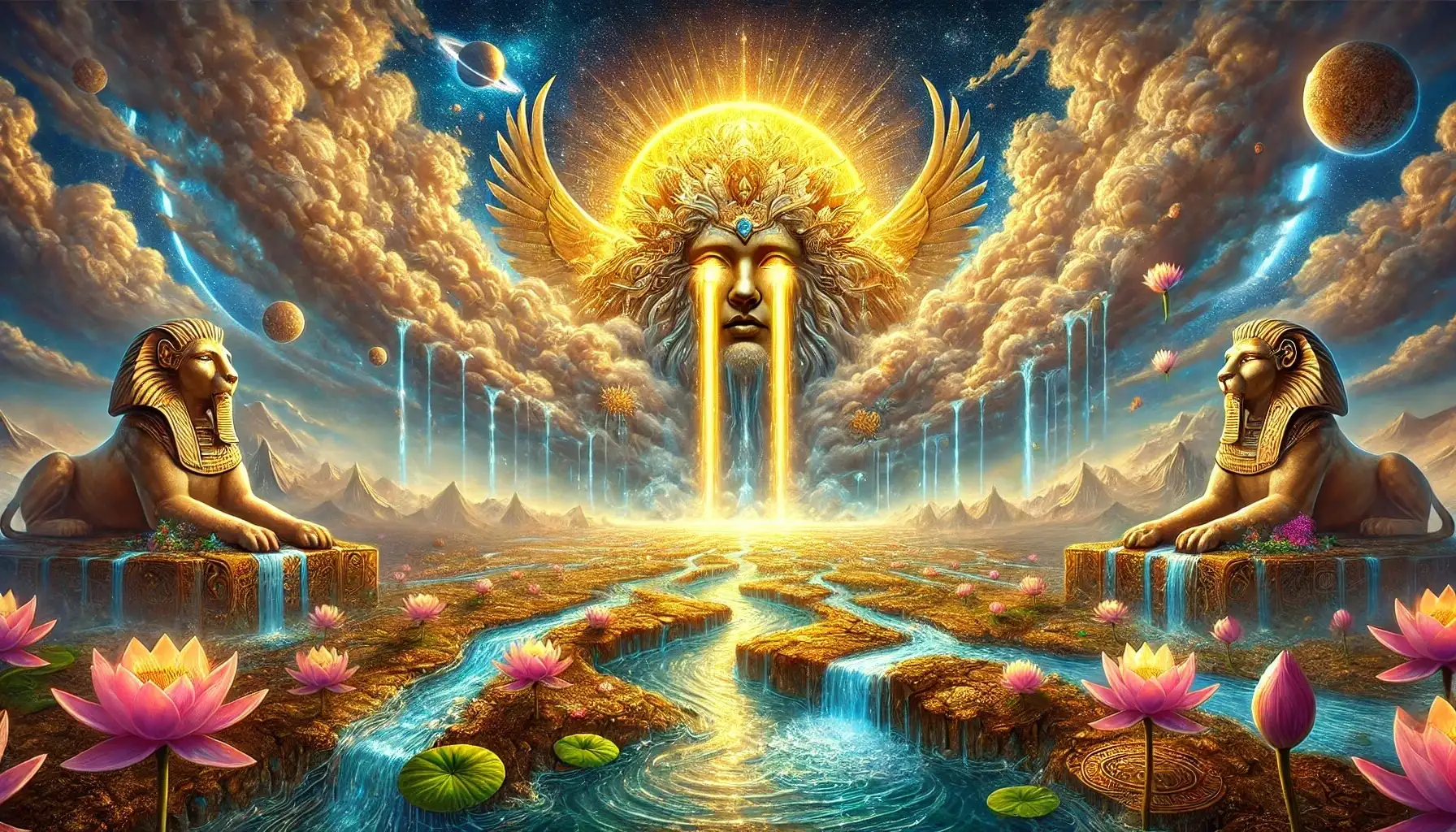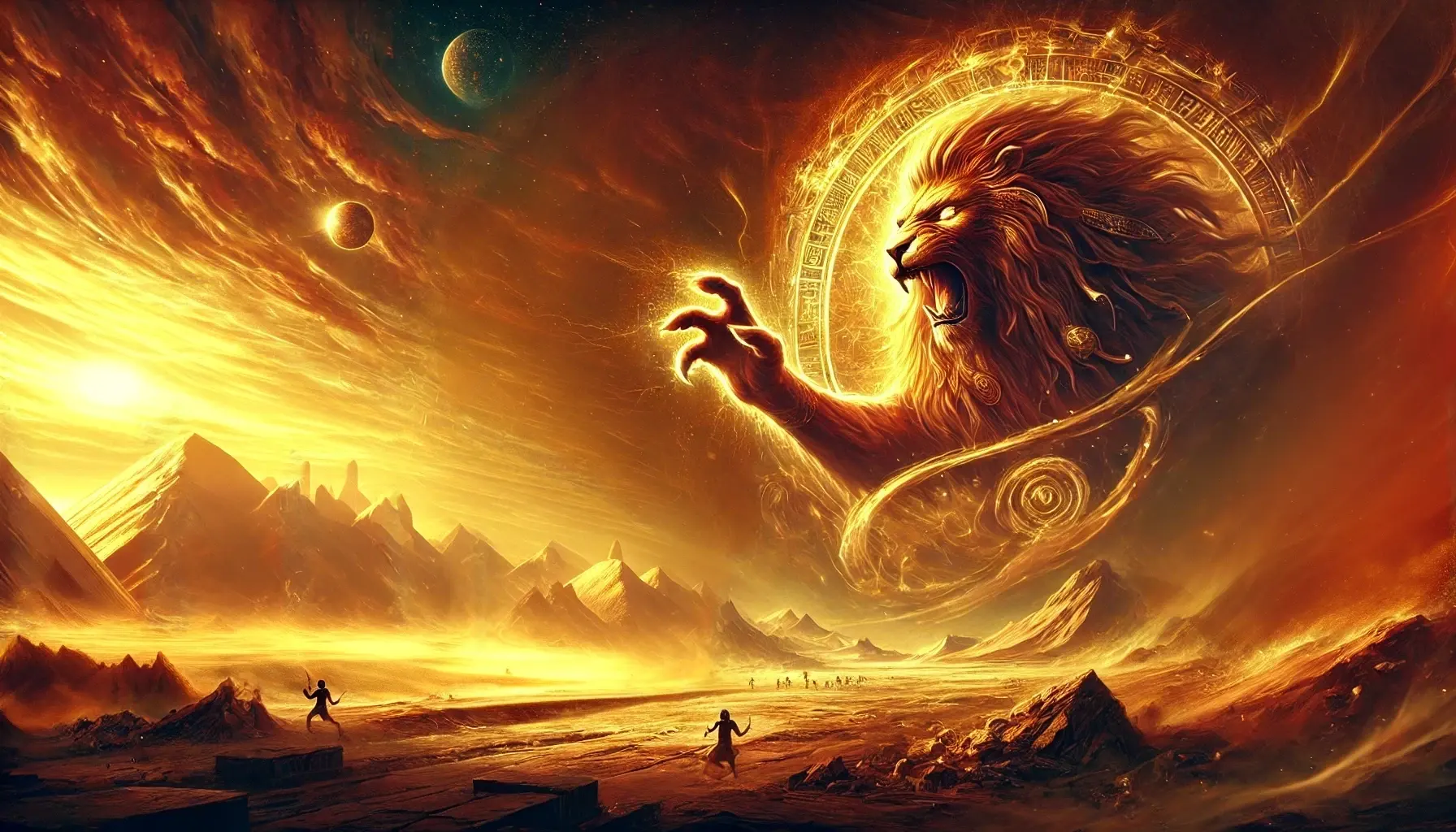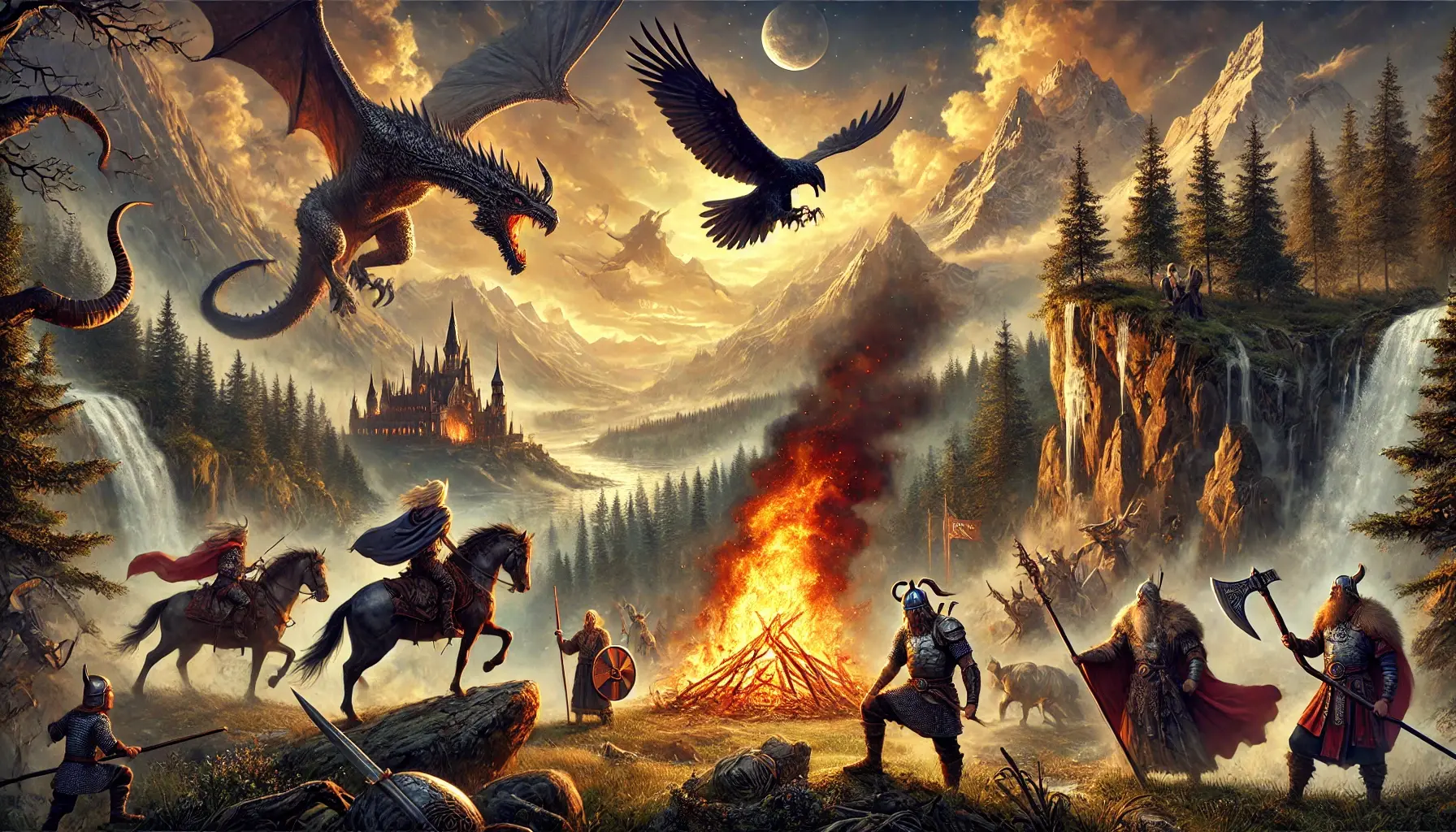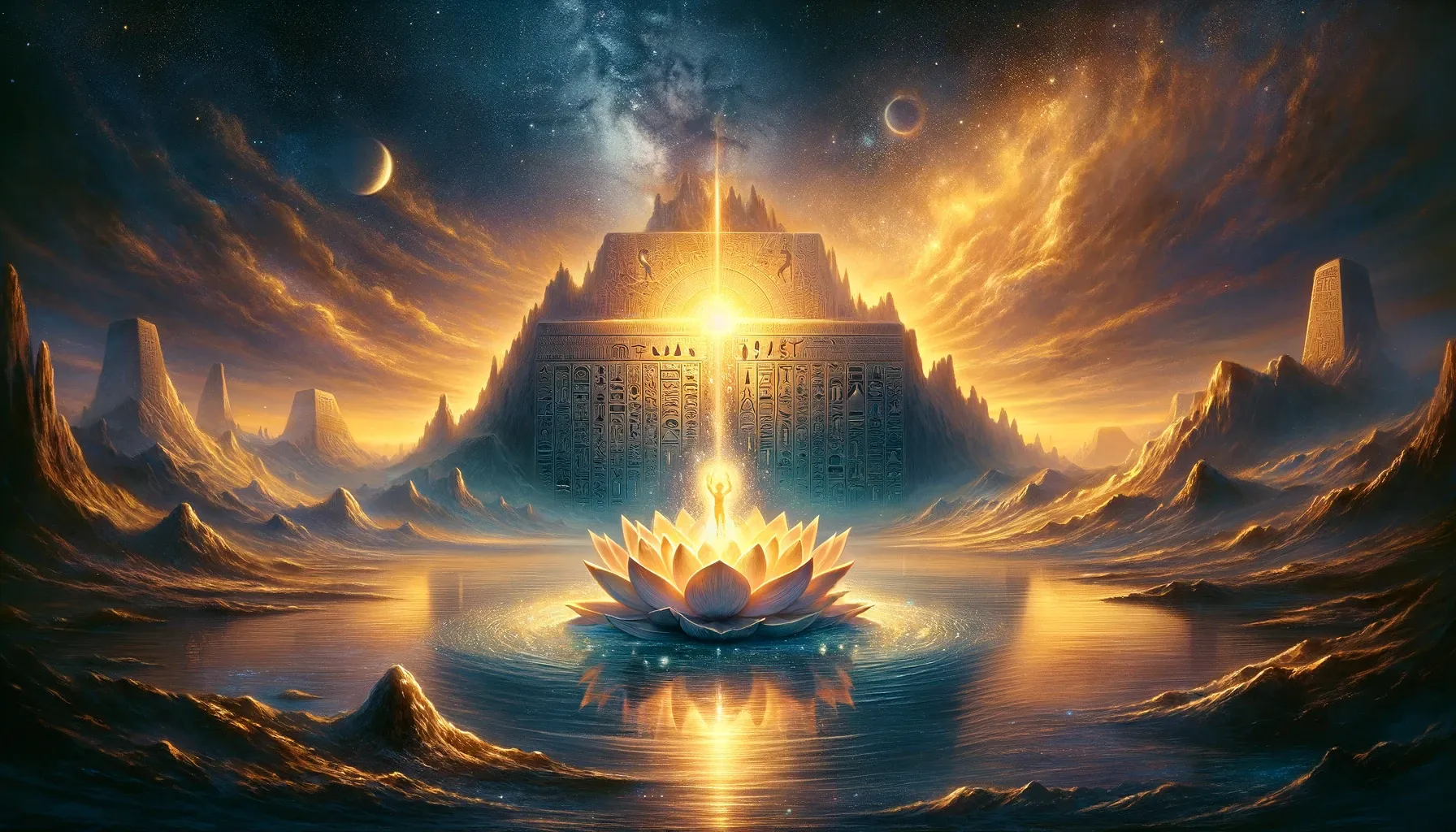The Weary King of the Gods
In the timeless expanse of ancient Egypt, when the desert sands still carried whispers of creation, Ra, the Sun God, ruled with sovereign might. He was both the illuminator of the heavens and the sacred force that ordered the world. Yet, the weight of eternal kingship bore heavily upon him. As the centuries passed, Ra grew weary, his once-bright gaze clouded with the shadows of discontent. His kingdom, while vast and bountiful, had begun to crumble beneath the pride and rebellion of humankind. The people, emboldened by the passage of time, mocked the decrees of the gods and questioned the authority of the one who birthed them.
The unrest reached Ra’s ears through the winds, carrying the blasphemies of mortals to his celestial throne. His heart, once radiant as the midday sun, dimmed with anger and sorrow. The god convened his divine court, summoning the Ennead, the nine primordial deities who governed creation, to deliberate on the fate of humanity.
The Council of the Gods
In the halls of the divine, where lotus blossoms floated upon sacred waters, Ra’s voice thundered like the roar of the Nile in flood. “My children have turned against me,” he declared, his tone a mixture of wrath and lamentation. “Their rebellion threatens the balance of Ma’at. Shall we allow their insolence to destroy what we have labored to create?”
The Ennead, seated in a semicircle around Ra, deliberated. Some urged mercy, recalling the frailty of mortals and their susceptibility to folly. But Sekhmet, the lion-headed goddess of war and vengeance, stood, her golden mane ablaze with righteous fury. “They must learn the price of defiance,” she proclaimed. “Let me descend upon them as your instrument of justice, O Ra. I shall cleanse the earth of their hubris.”
Moved by her fervor, and weary of the burden of judgment, Ra consented. “Go, Sekhmet,” he commanded, “and make them remember the power of the gods.”
The Wrath of Sekhmet
Sekhmet descended to the mortal realm like a tempest unleashed, her eyes gleaming with the fire of divine wrath. Where she tread, fields blackened, rivers ran red, and the cries of humanity echoed beneath the indifferent stars. Her claws rent the earth, and her breath, a searing wind, scorched all in its path. Cities crumbled, and the once-proud voices of the people fell silent, replaced by the lamentations of the dying.
The goddess reveled in her task, her thirst for vengeance insatiable. Each drop of blood spilled seemed to fuel her fury, and soon, her rampage became a maelstrom of destruction that threatened to consume all of Egypt. The balance of Ma’at—order and harmony—teetered perilously close to collapse.
Ra’s Regret
From his celestial barque, Ra watched the devastation unfold. What had begun as an act of justice now appeared as a descent into chaos. His heart, heavy with sorrow, could no longer bear the sight of his beloved creation’s annihilation. He realized too late the depth of Sekhmet’s ferocity, and the folly of unleashing such unbridled power.
“This must end,” Ra whispered, his voice trembling like the first light of dawn breaking over the horizon. Summoning his remaining strength, he devised a plan to save what remained of the world. He commanded his priests and servants to mix barley beer with the red ochre of the desert, creating a potion that resembled blood. This he poured into great basins, placing them in Sekhmet’s path as she roamed the desolate land.
The Turning of the Tide
Sekhmet, her bloodlust unquenched, stumbled upon the pools of crimson liquid. Believing it to be the blood of her prey, she drank deeply, her divine senses dulled by the potent brew. The beer, infused with Ra’s magic, lulled the goddess into a stupor, and her fiery rage subsided into a drowsy contentment. For the first time since her descent, the earth knew stillness, and the survivors dared to hope.
The land, though scarred, began to heal. Rivers returned to their courses, and the fields whispered once more with the promise of growth. Yet, the memory of Sekhmet’s wrath lingered in the hearts of humankind, a testament to the gods’ might and the fragility of their favor.
The Tears of Renewal
Ra, his heart softened by the suffering he had witnessed, wept for his children. His tears fell to the earth, mingling with the dust and ash of the ruined world. Where each tear touched the ground, life stirred anew. The sacred lotus blossomed, its petals a pale reflection of Ra’s sorrowful light, and the Nile surged with renewed vigor, its waters nourishing the parched land.
Humanity, chastened by the ordeal, offered prayers and sacrifices to the gods, vowing never again to stray so far from Ma’at. Ra, though still wearied by his eternal burden, found solace in the resilience of his creation. He resolved to guide them not with wrath, but with the quiet strength of the sun’s daily journey across the heavens.
The Eternal Balance
As the sun rose over Egypt, painting the land in hues of gold and crimson, Ra gazed upon the world he had both cursed and redeemed. In the stillness of dawn, he saw not only the scars of destruction but also the seeds of renewal. Sekhmet, now tempered, returned to the divine court, her rage quelled but her power undiminished. She stood by Ra’s side, a reminder of both the peril and the necessity of divine justice.
On the banks of the Nile, a child, her feet dusted with ash, plucked a lotus from the river’s edge. She held it aloft, its pale petals trembling in the morning breeze. In her eyes shone a reflection of the sun, and in her heart, the enduring promise of life. Ra’s light touched her face, and for a moment, the weary god smiled, his spirit buoyed by the quiet resilience of his people.
The child released the flower, and it drifted upon the water, a single fragile vessel carried by the eternal tide. The Nile bore it away, weaving it into the fabric of Egypt’s story, where gods and mortals shared the burden of existence, forever bound by the delicate balance of creation.
Thus, the tears of Ra, born of sorrow and redemption, became the lifeblood of the land, a reminder of the fragile harmony that sustains the world. And as the sun continued its journey, the lotus, a symbol of rebirth, bloomed anew, a quiet testament to the enduring bond between the divine and the mortal.
In the endless cycles of the Nile’s waters and the sun’s path across the sky, the legacy of Ra’s tears endured, a story told not in words but in the eternal rhythm of life itself.



